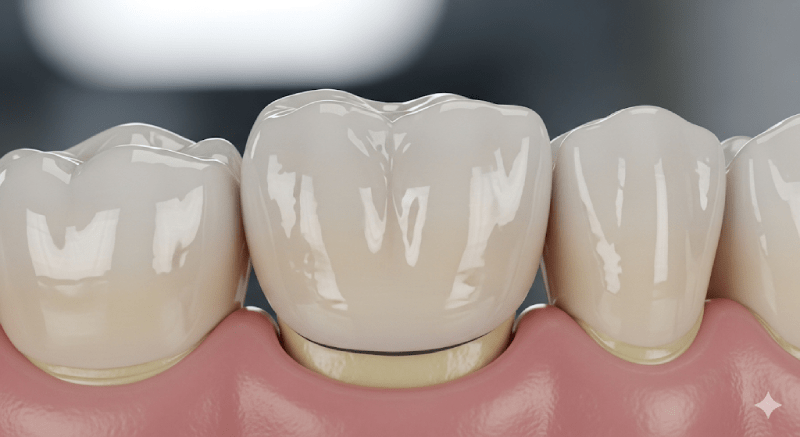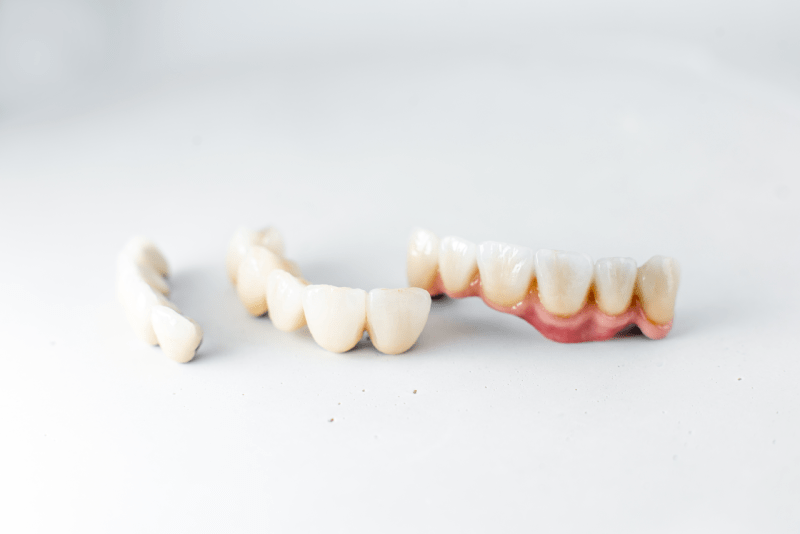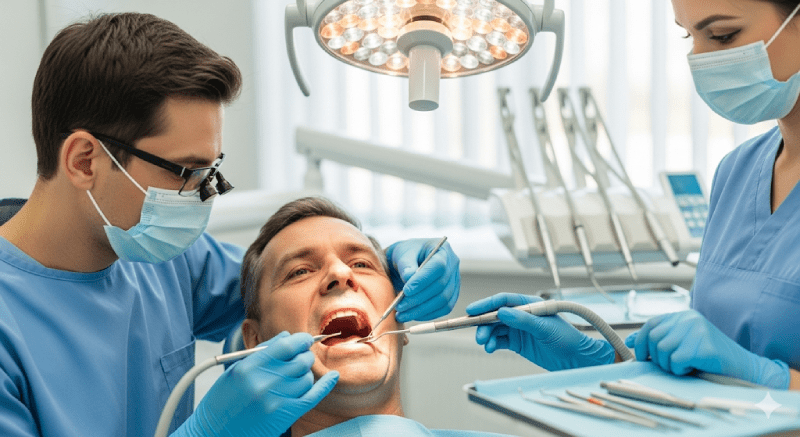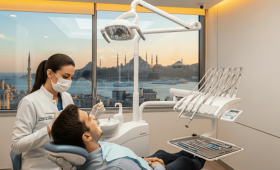Welcome to Turkey! With its fascinating history, rich culture, and breathtaking natural beauty, the country welcomes millions of visitors every year. Before embarking on this unique experience, you might want to get to know Turkey better, both as a tourist destination and a popular health tourism destination. This special guide, prepared to guide you throughout your trip, will answer all your questions about both a general Turkey tour and a dental holiday in particular.
Turkey lies at the intersection of East and West, transforming it into a cultural mosaic. From the historic streets of Istanbul to the fairytale valleys of Cappadocia, from the turquoise waters of the Mediterranean to the lush green plateaus of the Black Sea, every corner holds a treasure waiting to be discovered. The country’s rich cuisine, combining the unique flavors of kebabs, fresh seafood, and traditional desserts, will delight your palate.
You don’t need to worry about transportation options when planning your trip. Turkey’s modern airports, extensive bus networks, and advanced railway systems make intercity travel remarkably easy. Accommodation options range from budget-friendly hotels to boutique guesthouses, luxury resorts to stylish apartments. Whether you stay in a historic mansion or a beachfront hotel, Turkey’s hospitality will embrace you.
In addition to all this cultural richness, Turkey has become a prominent center for health tourism in recent years. The high-quality, affordable, and modern services it offers, particularly in dental care, make it a popular choice for many. This has fueled the popularity of the “dental holiday” concept, where you not only receive treatment but also have the opportunity to enjoy a vacation.
The first section of this guide covers the general atmosphere and practical information about Turkey. You’ll find helpful information on food, attractions, accommodation, and transportation. The second section answers frequently asked questions about health tourism, and dental holidays in particular. This way, you can enjoy a pleasant holiday and rejuvenate your smile at prices more affordable than those offered in your home country by receiving the best healthcare services.
The Most Frequently Asked Questions by Tourists Visiting Turkey
Turkey, with its rich historical and cultural heritage, is a popular destination that welcomes tourists from all over the world. We have compiled a more detailed list of the most frequently asked questions and their answers for those considering a trip to Turkey.
Visa, Currency, and Transportation
Is a visa required to travel to Turkey?
- A visa is required for many citizens traveling to Turkey, but some countries have a visa-free travel option. For passengers who do not have a visa exemption, applying for an online e-Visa is a very practical and fast method. You can complete your application in a few minutes via the official website of the Ministry of Foreign Affairs of the Republic of Turkey and receive your visa in your email address. This process eliminates the need to personally visit consulates. Before your trip, you should definitely check the travel advisories of your own country’s Ministry of Foreign Affairs and Turkey’s current visa regime. It is also important to consider general rules such as your passport being valid for at least six months from the end of your trip and having a sufficient number of blank pages. By making these checks, you can have a trouble-free entry.
What is Turkey’s currency and how can I exchange money?
- The official currency of Turkey is the Turkish Lira (₺). In most parts of the country, especially in tourist areas, credit card and debit card use is quite common and most businesses accept these payment methods. However, it is very important to have cash in smaller shops, local markets, or rural areas. The safest and most common methods for exchanging your currency are at exchange offices (Bureau de Change), banks, and at exchange offices in airports. Exchange rates at airports can be lower than those at exchange offices in the city center, so it is recommended that you only exchange a small amount initially and exchange the rest at better rates in the city center. Additionally, you can withdraw Turkish Lira from ATMs with international bank cards, but you should not forget that your bank may charge additional fees for this transaction.

How do you get from the airport to the city center?
- Transportation from the airport to the city center offers a variety of options depending on the city you are in. For example, in Istanbul, there are commonly used private bus services (Havaist and Havaş) to get to the city center from the main airports, Istanbul Airport (IST) and Sabiha Gökçen Airport (SAW). These buses provide comfortable and reasonably priced transportation to the main areas of the city. Additionally, a metro line also serves Istanbul Airport, which offers a faster travel option without being affected by traffic. Taking a taxi is always an option, but it can be more expensive depending on traffic density. As a more economical option, in some cities, municipal buses also run regular services between the airport and the city center. When making a transportation plan, it is useful to check the website of your arrival airport to get information about current transportation options and prices.
Culture and Traditions
What kind of clothes should I wear in Turkey?
- Turkey’s clothing culture can vary from region to region and from city to city. In western and coastal cities such as Istanbul, Izmir, or Antalya, the clothing style is generally modern, comfortable, and similar to European cities. Especially in the summer months, light clothes such as t-shirts, shorts, or dresses can be preferred. However, it is important to pay attention to dress codes if you are planning to visit religious places, especially mosques. When entering mosques, both men and women are expected to wear clothes that cover their shoulders and knees. Women must also wear a headscarf; head coverings are provided free of charge at the entrance of most mosques. In inland Anatolian regions like Cappadocia or in more traditional towns, it can be a good behavior to adopt a slightly more conservative clothing style to show respect to the local people. In these regions, long pants or skirts are more commonly preferred.
Is bargaining common?
- Bargaining is a cultural tradition that is common in Turkey, especially in local markets, carpet shops, handicraft workshops, and souvenir shops. It is not possible to bargain in large chain stores, supermarkets, or modern shopping malls. The bargaining process is seen as a sincere and friendly interaction between the seller and the buyer. Instead of accepting the first price the seller offers, you can start the process by making a reasonable offer. It is a common tactic to start by offering a price close to half and then reach an agreement at a midpoint. It is important to be patient and smile when bargaining; this will provide a more pleasant experience for you and help you establish better communication with the seller. Remember that bargaining is not only a tool to lower the price but also a cultural experience.
Do Turkish people speak English?
- The rate of English proficiency in tourist areas in Turkey is quite high. The majority of hotel, restaurant, cafe, and shop employees in popular tourist centers such as Istanbul, Cappadocia, Antalya, Bodrum, and Fethiye can speak English fluently or at a basic level. However, as you move outside the city centers or in less touristy places, it can be more difficult to find people who speak English. In this case, learning a few basic Turkish words and phrases (e.g., “Merhaba” – Hello, “Teşekkür ederim” – Thank you, “Afiyet olsun” – Enjoy your meal) will make it easier for you to communicate with the local people and will be highly appreciated by the Turks. The rate of English proficiency is lower, especially among the older generation. Carrying a small translation dictionary or a translation app on your smartphone can be very useful in unexpected situations.
Food and Drinks
Is tap water drinkable?
- Although tap water in Turkey is generally up to drinkable standards depending on the city’s network, it is generally recommended for tourists to use bottled water due to its taste and lime content. Bottled water is a safer option, especially for people with sensitive stomachs. Note that the water served in hotels or restaurants is usually bottled water. There is no harm in using tap water for personal hygiene purposes such as brushing your teeth or taking a shower. You can find large bottles of drinking water at very affordable prices in markets. If you are staying for a longer period or are worried about finding water in a rural area, it is the best solution to always carry a bottle of water with you. Also, it is important to check if the water source is drinkable before drinking water from public fountains, which are widely found in some cities.
Is it easy to find halal food?
- It is extremely easy to find halal food in Turkey. Since a large part of the country is Muslim, most restaurants and food businesses naturally use halal certified or halal standard compliant products. Meats served in traditional Turkish cuisine venues such as kebab restaurants, pide shops, and home-style food restaurants are usually obtained from animals slaughtered in accordance with Islamic rules. If you are a vegetarian or vegan, it is also very easy to find delicious and various options thanks to the vegetable-based Turkish cuisine. For example, there are many delicious alternatives such as lentil soup, vegetable stews, and olive oil dishes. If you have a specific diet restriction or an allergy, it is always best to inform the restaurant of this information.
How do you order Turkish coffee?
- Turkish coffee is a traditional beverage prepared with a special brewing method and noted for its delicious foam. When ordering coffee, you need to specify the amount of sugar in your drink. There are three different ways to order: sade (plain, without sugar), orta (medium, with a little sugar), or şekerli (sweet, with a lot of sugar). Plain coffee is ideal for those who want to experience the purest taste of coffee. Medium coffee is perfect for those looking for a soft sweetness. Sweet coffee offers a sweeter and more intense flavor. Turkish coffee is served in a small cup and is usually accompanied by a glass of water and Turkish delight. It is important to sip the coffee slowly and wait for the grounds to settle at the bottom. The grounds at the bottom of the cup are not drunk. While trying this traditional beverage, you can cleanse your palate by sipping the water served next to it, which allows you to appreciate the flavor of the coffee better with each sip.
Safety and Health
Is Turkey a safe place?
- Turkey is generally a safe country for tourists and welcomes millions of visitors every year without any problems. However, as with any major tourist destination, it is important to take basic safety precautions. You should pay extra attention to your personal belongings, wallet, and mobile phone in crowded markets, bus terminals, or popular tourist spots. There can be fake product vendors and some small scam attempts, especially in tourist areas, so it is useful to be careful. When walking alone at night, it is always safer to prefer well-lit and crowded streets. In an emergency, you can ask for help by calling 112. Due to Turkey’s cultural structure, the Turkish people are generally helpful and hospitable, so you should not hesitate to ask for help if you need anything.
Can I get information about health services and travel insurance?
- Turkey offers advanced health services in both the public and private sectors. Modern hospitals, clinics, and pharmacies can be easily found in big cities. In emergencies, you can call 112 to get an ambulance. Before your trip, it is highly recommended that you get comprehensive travel health insurance for possible health problems or emergencies. This insurance provides financial security for situations such as unexpected hospital expenses, doctor’s examinations, or medication costs. If you use regular medication, it is important to have enough medication with you for the duration of your trip. Additionally, preparing a basic first-aid kit before you come to Turkey and taking the necessary supplies for minor injuries or situations like headaches is a practical precaution. Pharmacies (called Eczane) are usually open until the evening and can sell basic medicines without a prescription.
What is a Dental Holiday in Turkey?
A dental holiday, also known as dental tourism, is the practice of traveling to a country other than one’s own, particularly a destination like Turkey where treatment costs are more affordable, to address dental health needs. This concept aims to combine a medical necessity with a holiday experience. In this way, individuals can access high-quality dental treatments while also having the opportunity to explore historical and natural beauties and enjoy a relaxing vacation. A dental holiday package is typically customized to the patient’s specific needs and can include not only the treatment plan but also airport transfers, accommodation arrangements, and local transportation. This allows patients to focus entirely on their recovery and rest without having to deal with any logistical issues during their treatment. This holistic approach has made dental holidays a global trend.
Why is Dental Treatment in Turkey So Popular?
Several key factors are at the heart of Turkey’s prominence in dental tourism. The primary reason is that, unlike the high costs in Europe, America, and other developed countries, Turkey offers the same quality of treatment at much more affordable prices. This cost difference becomes even more attractive when combined with the favorable exchange rate of foreign currencies against the Turkish Lira. In addition to the price advantage, dental clinics in Turkey maintain high-quality standards by investing in the latest technology and employing highly experienced dentists who have received reputable international education. Patients can start their treatment quickly in Turkey without the weeks or even months of waiting times they might face in their home countries. Lastly, Turkey’s rich cultural and historical heritage, magnificent natural landscapes, and warm climate transform the dental treatment process from a tedious procedure into an enjoyable holiday activity.

Are Dental Clinics in Turkey Safe?
Yes, many dental clinics in Turkey adhere to international standards that prioritize patient health and safety. The Turkish Ministry of Health regularly audits all private clinics and hospitals to ensure that quality and safety protocols are being followed. Furthermore, some clinics are accredited and certified by international accreditation bodies (e.g., Joint Commission International – JCI). These accreditations indicate that the clinic’s hygiene, sterilization, and patient care procedures comply with global standards. Dentists hold official documents that prove their education and competence. When choosing a reliable clinic, it is crucial to carefully examine the dentist’s license information, professional experience, and patient reviews regarding previous treatments. Most clinics transparently provide all this information on their websites to prove the quality of their services.
How Much Does Dental Treatment Cost in Turkey?
The cost of dental treatment in Turkey can vary greatly depending on the specific procedure the patient needs, the type of materials used, and the clinic’s location. However, in general, it is possible to save between 50% and 70% compared to prices in Europe and North America. For example, a dental implant or a series of porcelain veneer treatments can be performed at a much lower cost than in Western countries. This cost advantage stems not only from lower labor and operational costs but also from the attractive exchange rates for international patients. Before starting treatment, it is essential to request a detailed treatment plan and a written price quote from your clinic that includes all items (radiography, anesthesia, medications, possible extra fees, etc.). This transparent approach prevents you from encountering surprise costs.
Which Dental Treatments are Available in Turkey?
Turkey is known for its wide range of dental services. Among the most preferred and highest-quality treatments available are dental implants. In this treatment, lost teeth are permanently replaced by titanium roots placed in the jawbone. In cosmetic dentistry, zirconium and E-max crowns provide a natural and bright smile with aesthetic veneers placed on the teeth. In addition, professional teeth whitening procedures that lighten the color of teeth by several shades are also very popular. Another highly preferred method for smile aesthetics, laminate veneers (porcelain veneers), corrects the shape and color of teeth with thin porcelain layers bonded to the front surface. Besides these, modern orthodontic treatments such as clear aligners for teeth alignment, root canal treatment for deep dental issues, and fillings for tooth decay are also widely offered.
Can I Get More Than One Procedure Done in a Single Trip?
Yes, patients who come to Turkey for dental tourism often prefer to complete more than one dental treatment in a single trip. Thanks to modern dental technology and the clinics’ efficient planning skills, even comprehensive treatment plans can be completed in a short time. For example, a patient can book appointments for both a dental implant and several laminate veneer procedures on the same trip. The dentists and technicians at the clinic work together to accelerate the process for such intense treatment schedules and help the patient achieve the desired results before returning home. This method makes it possible for patients to save both time and travel costs. Sharing your treatment needs in detail with your clinic in advance will help create a customized and optimized travel plan for you.
How Long Does Dental Treatment in Turkey Take?
The duration of dental treatment varies according to the complexity of the procedure. Simple procedures such as teeth whitening or fillings can usually be completed within one or two days. More comprehensive treatments like aesthetic crowns or veneers, including taking impressions, the laboratory phase, and the final placement appointments, usually take 3 to 7 days. If a more long-term treatment like a dental implant is planned, a 1-3 day visit might be enough for the implant placement, but a waiting period of 3-6 months may be required for the implant to fuse with the bone (osseointegration). After this waiting period, the patient should make a short second visit to have the prosthetic tooth attached to the implant. Therefore, it is important to clarify your treatment duration and travel plan with your clinic beforehand.
How Are Accommodation and Transportation Organized in Turkey?
Dental clinics in Turkey offer comprehensive logistical support to make the travel experience for international patients as comfortable as possible. Many clinics include airport transfers in their treatment packages. From the moment the patient’s plane lands, they are met by an authorized clinic staff member and escorted to their hotel or the clinic in a private vehicle. Similarly, all transfers between the clinic and the hotel during the treatment period are also usually provided by the clinic free of charge. Regarding accommodation, clinics often have agreements with hotels where they offer special discounted rates or include accommodation directly in the package content. This detailed organization allows patients to focus solely on their treatment while all other logistical details are managed by professionals.
How is Communication Provided in Turkey?
The concern about communication, which is one of the biggest worries for international patients coming to Turkey for dental treatment, has been effectively solved by clinics. Many clinics employ patient coordinators who speak different languages such as English, German, Arabic, and Russian. These coordinators accompany patients from their first contact throughout the entire treatment process, answering their questions and providing detailed information about the treatment plan. Additionally, translation services can be provided when necessary during the treatment. This staff ensures that patients feel comfortable and fully understand the treatment process. Modern communication tools like WhatsApp and email are actively used for pre- and post-treatment communication, providing quick answers to all the patient’s questions.
What Should I Do for Post-Treatment Check-ups in Turkey?
Post-treatment check-ups after dental treatment in Turkey are usually managed in two ways. If a situation arises that requires you to return to the clinic immediately after treatment, this is typically planned within the treatment package. In the long term, the clinic stays in contact with its patients and offers online consultation services. Thanks to this service, patients can convey any questions they have about their treatment to their dentists at the clinic through video calls or messages, even while in their home country. Additionally, patients can show their treatment reports and X-rays to their dentists in their home country for routine check-ups. In this process, the Turkish clinic can cooperate with the patient’s local dentist to provide the necessary information and document flow. This flexible approach makes it possible for patients to easily follow up on their treatments.
Is the Dental Treatment Process in Turkey Painful?
Thanks to modern dentistry practices and the advanced technology of clinics in Turkey, the dental treatment process is generally painless. Local anesthesia is administered before every procedure to ensure the patient’s comfort. With the effect of the anesthesia, the patient does not feel any pain during the procedure. After the procedure is finished and the anesthesia wears off, there may be slight sensitivity, swelling, or discomfort, but these conditions can be easily controlled with prescribed painkillers or simple ice applications. Clinics provide all necessary medications and care instructions to ensure patients are comfortable during the post-procedure period. This allows patients to get through the post-treatment phase with minimal discomfort and return to their daily lives quickly.
Which Cities Should I Choose for a Dental Holiday in Turkey?
The most popular and preferred cities for dental tourism in Turkey are those that have high-quality clinics as well as a wealth of tourist attractions. Istanbul stands out with its modern and historical clinics. It offers countless activities like the historical peninsula, the Grand Bazaar, and Bosphorus cruises. Antalya is an ideal option for those who want to relax, with its beautiful beaches, luxury hotels, and year-round sunshine. Izmir is known as the pearl of the Aegean Sea and offers a more serene atmosphere. The clinics here are also highly developed in terms of both quality and service. Lastly, Bodrum, a popular holiday resort in Muğla, is a popular destination for younger patients and tourists with its world-class clinics, vibrant nightlife, and unique bays. Each city offers a different experience, allowing patients to choose according to their preferences.

Is a Visa Required for a Dental Holiday in Turkey?
Whether a visa is required to enter Turkey depends on the traveler’s country of citizenship. Many European citizens have the right to travel to Turkey visa-free. However, for citizens of some countries, an e-visa or a visa from a consulate may be required before travel. Before planning your trip, it is safest to check the current visa regulations by visiting the official website of the Ministry of Foreign Affairs of the Republic of Turkey or by consulting the Turkish embassy or consulate in your country. Whether a medical visa is required for dental treatment also depends on citizenship. The patient coordinators at the clinics can also assist you with this matter.
Is There a Guarantee for Dental Treatments in Turkey?
Yes, many reputable dental clinics in Turkey offer a guarantee for the treatments they perform. This guarantee usually covers permanent and high-cost procedures such as implants, crowns, and veneers. While the warranty period and conditions vary by clinic, an implant typically comes with a 5-year or longer warranty, and crowns and veneers are usually guaranteed for 1-2 years. The warranty generally covers potential defects in the material itself or operational errors. However, situations such as the patient not paying attention to post-treatment oral hygiene or not following the dentist’s recommendations may void the warranty. Before starting treatment, it is important to learn the warranty conditions in detail from the clinic and request a written document to protect your rights in case of a problem.
How Can I Find Out What’s Included in the Prices in Turkey?
When getting a price quote, it is crucial to clarify whether it is an “all-inclusive” package or just the treatment cost. A detailed quote allows you to know all potential costs you might face during your treatment in advance. Asking the clinic the following questions will help you get a clear idea of the total cost: Does the price include the initial examination and radiography fees? Is the anesthesia fee included in the price? Is there an extra charge for materials used, such as implant screws or porcelain materials? Are logistical services like airport transfers and accommodation included in the price, or do I need to pay for them separately? Will there be an extra charge for post-treatment medications or follow-up appointments? The answers to these questions will help you understand the scope of the price you’re offered and plan your budget correctly.
How Can I Check the Experience of a Dentist in Turkey?
Choosing the right dentist for your dental treatment in Turkey is one of the most critical steps for a successful outcome. You can follow a few important steps to check the dentist’s experience and expertise. First, inquire about the dentist’s diploma and professional certificates, especially those related to their area of specialization. Learning about the dentist’s university education and any international seminars or courses they have attended can provide information about their competence. Examining a portfolio of “before and after” photos of similar cases they have completed, either at the clinic or on the dentist’s website, gives you a concrete idea of the dentist’s aesthetic and technical skills. Additionally, reading reviews from other patients of the clinic on online platforms and following their social media accounts can provide extra information about the dentist’s patient satisfaction and professionalism.
What Should I Pay Attention to Before and After Treatment in Turkey?
The things to pay attention to before and after treatment directly affect the success of the treatment and the patient’s comfort. Before treatment, you must strictly follow all instructions given by your clinic. For example, if you use blood thinners, smoke, or have a special diet, you must inform your dentist. Often, you are asked not to eat or smoke for several hours before the procedure. After treatment, you must strictly adhere to the oral hygiene rules recommended by your dentist. Regular brushing, flossing, and using the prescribed mouthwashes will extend the life of the treatment. Avoiding hot or hard foods and reducing alcohol and nicotine consumption for the first few days will also speed up the healing process. All these details will be provided to you by your clinic, either in writing or verbally.
Which Technologies Do Clinics in Turkey Use?
Modern dental clinics in Turkey invest in the latest technological equipment to offer their patients the most effective and comfortable treatment. These technologies include digital radiography and 3D imaging (tomography) systems that provide a detailed view of the teeth and jaw structure. Thanks to these devices, dentists can see all the details before starting treatment and make the most accurate plan. CAD/CAM (computer-aided design and manufacturing) technology, which is frequently used in cosmetic dentistry, allows restorations like crowns, veneers, and bridges to be designed and produced in a single day. This eliminates the need for patients to make multiple visits for the treatment. Additionally, laser technology used in soft tissue procedures speeds up the healing process and minimizes bleeding.
When Should I Book for Dental Treatment in Turkey?
The timing for booking dental treatment in Turkey is closely related to the purpose and period of your trip. Clinics can be very busy, especially during the peak tourism season in the summer months (June-August) and holiday periods like New Year’s. If you plan to travel during these times, it is recommended to book several weeks or even a few months in advance to ensure you find an open slot at the clinic and to find more affordable prices for flights and accommodation. During calmer periods like spring (March-May) or autumn (September-November), you can plan more flexibly. Booking early ensures that your treatment plan is more efficient and helps you optimize your travel budget.
Is a Dental Holiday in Turkey a Safe Option?
Yes, a dental holiday in Turkey is a very safe and effective option as long as you do the right research and choose the right clinic. As a leading country in global health tourism, Turkey places great importance on health and safety standards. The country’s clinics offer advanced infrastructure and experienced staff to facilitate the flow of international patients. The key is to base your choice on the clinic’s accreditations, the dentists’ experience, and patient reviews, not on advertisements. If you make your choice based on these criteria, you can receive high-quality treatment and safely enjoy your trip. Turkey is an ideal destination for those who want to improve their dental health, with its economic advantages and tourist attractions.


